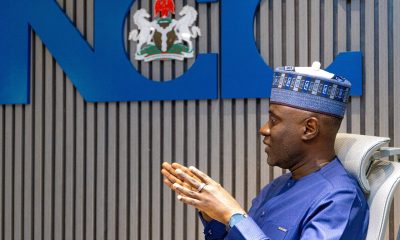Comments and Issues
NDLEA’S IDEOLOGY OF STAFF WELFARISM
Published
1 year agoon

There is little doubt that rewarding and recognizing your staff for their hard work and achievements can be a powerful motivator. This could include monetary rewards, public recognition, or opportunities for career advancement. Job satisfaction is a key factor in staff motivation. if employees are satisfied with their work. they will be more motivated to do their best. this can include factors such as a supportive work environment, fair pay, and opportunities for growth and development.
Giving employees autonomy and control over their work can be highly motivating. This according to Miss. Ujunwa Fidel a psychologist based in Owerri, Imo state, could involve allowing employees to make decisions and giving them responsibility for their own work, when employees have autonomy, they feel more satisfied with their work. This can lead to increased loyalty and commitment to their employ workers in any organization need something to keep them working. Most of the time, the salary of the employee is not enough to keep him or her working for an organization. An employee must be
motivated to work for a company or organization. If no motivation is present in an employee, then that employee’s quality of work or all work in general will deteriorate. People differ on a personality dimension called locus of control. This variable refers to individual’s beliefs about the location of the factors that control behavior.
Understanding what motivates an organization’s employees is central to the study of I–O psychology. Motivation is a person’s internal disposition to be concerned with and approach positive incentives and avoid negative incentives. While motivation can often be used as a tool to help predict behaviour it varies greatly among individuals and must often be combined with ability and environmental factors to actually influence behaviour and performance. Because of motivation’s role in influencing workplace behaviour and performance, it is key for an organizations to understand and to structure the work environment to encourage productive behaviors and discourage those that are unproductive.
There is general consensus that motivation involves three psychological processes:Arousal; direction and intensity.
According to Vroom’s Expectancy Theory, an employee will work smarter and harder if he believes his additional efforts will lead to valued rewards. Expectancy theory explains this increased output of effort by means of the equation F = E (Σ I × V).
Expectancy theory has been shown to have useful applications in designing a reward system. If policies are consistently, clearly and fairly implemented, then the instrumentality would be high. If the rewards are substantial enough to be meaningful to an employee, then the valence would be also considered high.
Now let us delve into the primacy or the tells of this reflection which is on How NDLEA’s Reward Strategy Fuels Success.
We therefore argue that in the realm of organizational management, reward systems are often highlighted as crucial tools for driving productivity, boosting employee morale, and fostering a culture of excellence. When effectively implemented, they can transform an organization, instilling a sense of purpose and motivating employees to go above and beyond. A compelling example of this is the transformation of the National Drug Law Enforcement Agency (NDLEA) under the leadership of Brigadier General Mohamed Buba Marwa (Rtd).
Since assuming office as the Chairman/Chief Executive Officer of the NDLEA, Marwa has prioritized staff welfare—a philosophy that emphasizes the well-being and professional growth of employees. This approach goes beyond theory and is evident in the consistent and transparent reward system he has established. Under Marwa’s leadership, NDLEA officers who exhibit exceptional dedication, bravery, and professionalism are recognized with special promotions, commendations, and other forms of acknowledgment. This practice has not only elevated individual officers but has also significantly enhanced the agency’s overall efficiency and effectiveness.
The value of a reward system lies in its ability to create a positive feedback loop. When employees know that their hard work will be recognized and rewarded, they are more likely to put in the extra effort required to achieve organizational goals. This is particularly important in high-stakes environments like the NDLEA, where officers are tasked with the dangerous and demanding job of combating drug trafficking and abuse. By instituting a robust reward system, Marwa has successfully created an environment where excellence is not just encouraged but expected.
A striking example of this is the recent special promotion of eight officers from the Marine Command of the NDLEA. These officers were honored for their courageous and professional conduct during a perilous operation on the Lagos waterways. Despite facing significant challenges, including attempts by criminals to thwart their efforts, the officers successfully intercepted and seized 60 jumbo bags of illicit drugs being smuggled into Nigeria from Ghana. The operation, which also led to the arrest of a Ghanaian suspect and the recovery of a boat and other exhibits, was a testament to the officers’ dedication and bravery.
During a ceremony at the NDLEA’s National Headquarters in Abuja, Marwa personally decorated the officers with their new ranks and presented them with commendation letters. He emphasized that such achievements tell the story of the new NDLEA and reinforce the agency’s commitment to its mandate. Marwa’s recognition of these officers not only boosts their morale but also sets a standard for others to aspire to.
This promotion is not an isolated incident but part of Marwa’s broader strategy to incentivize excellence within the NDLEA. Since taking office, he has introduced several initiatives aimed at enhancing staff motivation and performance, including the bi-annual Command Awards and Commendations, as well as special promotions for deserving officers. These initiatives reward hard work, results, and sacrifice, thereby fostering a culture of excellence within the agency.
In an unprecedented move that underscores the importance of these reward systems, Marwa approved the promotion of a total of 5,042 personnel, marking a significant milestone in the agency’s history. Among those promoted were two senior officers elevated to the rank of Deputy Commander General of Narcotics (DCGN), 22 officers promoted to Assistant Commander General of Narcotics (ACGN), and 66 officers to Commander of Narcotics (CN). This massive promotion exercise, following weeks of rigorous examinations and interviews, is part of an ongoing effort to enhance human resource management, particularly in staff motivation and welfare.
The promotion ceremony, held in Abuja on July 10, 2024, also saw Marwa reward 15 commands and 70 personnel for their outstanding performances in the first half of 2024. He reiterated that the prompt promotion of deserving officers remains a top priority. Marwa highlighted the agency’s achievements, stating, “We continue to wax stronger on this journey we embarked on three and a half years ago when we decided to turn around the fortunes of this agency by improving our performance as a precursor to reversing the perilous drug use situation in our dear country, Nigeria.” The NDLEA’s success, recognized both domestically and internationally, affirms the agency’s commitment to its mandate.
This event was not just about celebrating promotions and awards but also about reinforcing the agency’s commitment to its core values of integrity, hard work, and transparency. Marwa’s leadership has been pivotal in instilling these values within the agency, ensuring that the NDLEA’s operations are conducted with the highest standards of professionalism. He urged all officers to remain upright and committed to their duties, reminding them of the trust placed in them by society, the government, and international partners.
In addition to promotions and awards, Marwa announced the creation of five new strategic commands in Lagos, FCT, MMIA, Apapa, and Tincan. This move is part of a broader strategy to enhance the efficiency and effectiveness of the NDLEA’s operations. To further bolster operational integrity and officer safety, the agency will also deploy body cameras for use in strategic operations. These measures underscore Marwa’s commitment to modernizing the NDLEA and equipping it with the tools necessary to tackle the evolving challenges of drug enforcement.
The significance of these initiatives cannot be overstated. By creating new commands and deploying advanced technology, the NDLEA is better positioned to respond to the complex and dynamic nature of drug trafficking and abuse in Nigeria. Marwa’s approach to leadership, combining a focus on staff welfare with a strategic vision for the agency’s future, has set a new standard for public sector management in Nigeria.
The promotion of over 5,000 officers symbolizes Marwa’s efforts to break the cycle of stagnation that once plagued the NDLEA. Under previous leaderships, many officers faced years of stagnation without promotion, leading to low morale and diminished performance. Marwa’s administration has made it a priority to ensure that deserving officers are recognized and rewarded promptly, thereby boosting morale and encouraging a culture of excellence.
In his address to the promoted officers, Marwa stated, “The reward for work well done is more work, and in our case, we cannot rest on our oars until all the objectives of our mandate are fully achieved. May I remind us that the bottom line is a drug-free Nigeria.” This statement encapsulates the ethos of the NDLEA under Marwa’s leadership—continuous improvement, relentless pursuit of goals, and an unwavering commitment to the agency’s mission.
The impact of these initiatives has been profound. Under Marwa’s leadership, the NDLEA has achieved significant milestones in its fight against drug trafficking and abuse. The agency has successfully dismantled numerous drug cartels, seized large quantities of illicit drugs, and secured convictions for a record number of drug offenders. These achievements are a direct result of the agency’s commitment to maintaining high standards of professionalism and integrity, reinforced through the reward system.
Marwa’s focus on staff welfare and motivation is not just about rewarding past performance; it is also about preparing the agency for future challenges. The NDLEA operates in a dynamic and often hostile environment, where drug traffickers constantly adapt their methods to evade detection. To stay ahead, the agency needs a workforce that is not only skilled and knowledgeable but also highly motivated and resilient. By providing officers with the recognition and rewards they deserve, Marwa has ensured that the NDLEA remains a formidable force in the fight against drug trafficking.
However, while the NDLEA’s reward system has been highly effective, there are areas where further improvements could be made. One such area is the financial autonomy of the agency. Currently, the NDLEA operates under the Ministry of Justice, which can limit its operational flexibility and access to resources. Given the critical nature of the NDLEA’s work, the agency must be granted greater operational autonomy, possibly by being placed directly under the office of the President or being made a fully autonomous body. This would not only enhance the agency’s ability to respond to emerging threats but also ensure that it has the necessary resources to sustain its operations.
The NDLEA’s success under Marwa’s leadership is a powerful argument for the importance of strong and charismatic leadership in government agencies. Marwa’s personal commitment to staff welfare and his emphasis on rewarding excellence have been key factors in the agency’s achievements. However, the NDLEA’s success should not solely depend on Marwa’s leadership. The agency needs to institutionalize these practices so they can be sustained beyond Marwa’s tenure. This requires a comprehensive review of the agency’s legal framework to ensure it is equipped with the necessary tools and autonomy to continue its work effectively.
In addition to granting the NDLEA greater autonomy, there is also a need for increased investment in the agency’s infrastructure and resources. While the NDLEA has made significant strides in recent years, it still faces considerable challenges, particularly in terms of funding and equipment. For instance, the agency’s Marine Command, which has played a crucial role in intercepting drug shipments on the waterways, would benefit from additional boats, surveillance equipment, and officer training. Similarly, other departments within the NDLEA could benefit from enhanced resources to improve their operational capabilities.
Furthermore, the NDLEA’s reward system could be expanded to include other forms of recognition, such as financial bonuses, educational opportunities, and career development programs. These incentives would not only motivate current employees but also attract new talent to the agency. In a competitive job market, where many young people seek meaningful and rewarding careers, the NDLEA could position itself as an employer of choice by offering a comprehensive package of rewards and benefits.
It is also worth considering how the NDLEA’s approach to staff welfare could be applied to other government agencies in Nigeria. Many public sector organizations in the country struggle with low morale, high turnover, and inefficiency. By adopting a similar reward system, these agencies could improve their performance and achieve better outcomes for the public. This would require a cultural shift within the Nigerian public sector, where the emphasis is often on seniority and tenure rather than performance and results. However, the success of the NDLEA under Marwa demonstrates that such a shift is possible and that it can yield significant benefits.
In conclusion, the NDLEA’s transformation under Brigadier General Mohamed Buba Marwa (Rtd) is a testament to the power of effective leadership and the importance of reward systems in driving organizational success. By prioritizing staff welfare and recognizing excellence, Marwa has not only improved the morale and performance of NDLEA officers but also enhanced the agency’s ability to fulfill its mandate. The lessons from Marwa’s leadership of the NDLEA can and should be applied more broadly across the Nigerian public sector. By doing so, Nigeria can build a more efficient, effective, and motivated public service, capable of meeting the challenges of the 21st century.
*Emmanuel Onwubiko is head if the HUMAN RIGHTS WRITERS ASSOCIATION OF NIGERIA and was NATIONAL COMMISSIONER OF THE NATIONAL HUMAN RIGHTS COMMISSION OF NIGERIA.
Trending

 Health1 week ago
Health1 week agoPolice open probe eight months after twin toddlers’ deaths following vaccinations

 Health1 week ago
Health1 week agoExpert warns smokers, people with high cholesterol face elevated diabetes risk

 Latest6 days ago
Latest6 days agoTwo more Rivers lawmakers call for halt to Fubara impeachment

 News1 week ago
News1 week agoJakande Estate residents allege illegal demolition, tasks Sanwo-Olu

 Business6 days ago
Business6 days agoRising fuel costs, policy push signal EV boom in Nigeria as industry predicts 2026 takeoff

 Business1 week ago
Business1 week agoFG, KPMG meet in Abuja to resolve disputes over new tax laws

 Football1 week ago
Football1 week agoAngola targets Super Eagles Coach Eric Chelle with lucrative offer

 Business1 week ago
Business1 week agoNCC initiates study on competition in Nigerian telecom industry

